Adventures of a cold war interceptor pilot

The cold war essentially guaranteed that all human nerves in the USA and USSR would be on edge. Tensions were on steroids for nearly two decades. Ubiquitous fallout shelters and air-raid sirens were the norm, designed for wary civilians that periodically trained for possible incoming air-raid onslaughts. The USA and the USSR had missiles, fighters, and bombers loaded for bear and poised to fly at a moment’s notice. This was not only near the U.S. borders but also scattered throughout the entire country. Meet Capt. Danny Cox, a U.S. Air Force (USAF) Cold War interceptor pilot, a breed that was a major factor in America’s defensive war plan.
Cox joined the USAF in February 1957 and learned to fly in bare aluminum Beech T-34A Mentors and North American T-28A Trojans at Moore Air Force Base (AFB) in Texas. Later he flew Lockheed T-33A Shooting Stars at Greenville AFB in Mississippi for jet qualifications, and received his wings mid-1958.
Cox, standing at a towering height of 5 feet 4 inches, barely met the minimum height requirement to fly fighters at the time, but ended up logging more than 2,400 hours of fighter time throughout his career. A product of his height, he had earned call signs such as “Two Cushion,” “Mighty Mouse,” “Madison Avenue Midget,” and “Compact Crusader.” Having had the opportunity to work closely with Cox for this feature, I noted that he has the admirable quality of being humble about his height and carries no chip on his shoulder. In fact, he pitches in on the fun if there is an opportunity to bring up “shorty” jokes or comments. In the fighter communities, his small frame meant that he could withstand and recover from G-forces much better than his alpha-male peers. Being short is a desired trait when flinging around fast movers.
D-Model Sabres
هذه القصة مأخوذة من طبعة February 2019 من Flight Journal.
ابدأ النسخة التجريبية المجانية من Magzter GOLD لمدة 7 أيام للوصول إلى آلاف القصص المتميزة المنسقة وأكثر من 9,000 مجلة وصحيفة.
بالفعل مشترك ? تسجيل الدخول
هذه القصة مأخوذة من طبعة February 2019 من Flight Journal.
ابدأ النسخة التجريبية المجانية من Magzter GOLD لمدة 7 أيام للوصول إلى آلاف القصص المتميزة المنسقة وأكثر من 9,000 مجلة وصحيفة.
بالفعل مشترك? تسجيل الدخول

Keeping 'em Flying!- The new generation of warbird pilots, restorers and mechanics
The new generation of warbird pilots, restorers and mechanics. Nearly 80 years after the end of World War II, the fighters, bombers, and trainers that defended freedom continue to enthrall and inspire audiences at airshows, thanks to generations of warbird pilots, maintainers, restoration specialists and collectors. In our September, 2022 issue we introduced you to the young warbird pilots, maintainers and restorers who are already beginning to displace more "experienced" warbird fliers and fixers.

The Corsair Maker- Bringing the Vought Corsair to the fleet was a daunting challenge that spanned nearly three years.
When the first production Corsairs exited the Stratford factory in June 1942, Guyton, as seen here, was tapped to manage the flight and production test program. Armament was improved to six wing-mounted .50s, displacing the wing fuel tanks now placed forward of the cockpit which necessarily was moved rearward by 32 inches. Overall length was increased, armor plate added, landing, arresting and tail gear improved, aileron control enhanced, and a new version of the R2800 engine was incorporated. But those significant improvements unearthed numerous idiosyncrasies that would take an extended period to make the Corsair acceptable for carrier operations
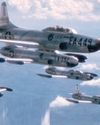
STARFIRES Over Korea
F-94 pilots tangle with MiGs
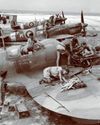
Training Mission
BY THE TIME THIS TRAINING SCENE WAS RECORDED in Canne, Italy, in July 1944, Allied Yugoslavian airmen had several years of experience working side by side with the RAF.
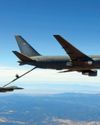
KC-46A PEGASUS
Next generation aerial refueler
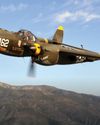
"SATAN'S ANGELS" ACE - Tales from a P-38 pilot in the South Pacific
\"AS A KID GROWING UP on the bow of my father's tugboat, hauling oil from Seattle to Alaska, I had a lot of time on my hands.
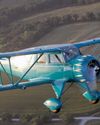
WACO YKC - Stunning and Ultra Rare Golden Age Cabin Flier
BETWEEN THE IMPLEMENTATION of the Air Commerce Act of 1926 and December 31, 1948, all U.S. registered flying machines sported an N-number, much as they do today, the \"N\" being an internationally recognized identifier for the United States. During that period, however, an additional letter-identifier followed the \"N.\" Depending on their category, they were registered in the NC (Commercial), NG (Glider), NL (Limited), NR (Restricted, usually meaning race airplanes), NS (State government), and, finally, NX (experimental).
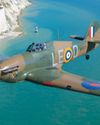
BADER'S HURRICANES
Double amputee fighter ace Douglas Bader and his Battle of Britain Hurricanes
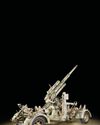
Scourge of the Allied Fighters
IT HAD TO BE THE MOST HELPLESS FEELING in the world: you're at 25,000 feet over Europe knowing that your primary function is to drop bombs-or flying escort for the bombers while being a slow-moving target for some of the world's finest shooters. However, you have John Browning's marvelous .50 caliber invention to give some degree of protection. Unfortunately, you're absolutely helpless against flak. Piloting and gunnery skills play no role in a game where sheer chance makes life and death decisions. For that reason, the Krupp 88 mm Flak 18/36/37 AA cannon could be considered WW II's ultimate stealth fighter. You never saw it coming.
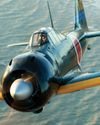
ZERO MYTH, MYSTERY, AND FACT
A test pilot compares the A6M5 Zero to U.S. fighters